Overview
- Brief Narrative
- Cardboard cutting template brought with Isidor Muschel, his wife, Ida, and their daughter, Dorit, when they left Vienna, Austria, for the United States in 1938. Isidor, a master furrier, used this rectangular template to shape sections of animal fur for use in handcrafted garments. On March 13, 1938, Germany annexed Austria. New legislation was created that quickly restricted Jewish life. Not long after, Isidor was publically humiliated in the street and later, he was arrested and taken to the train station where he escaped before he was deported. Ida’s mother, Rosa Rubel, helped Isidor, Ida, and their newborn daughter, Dorit, find an American to sponsor their immigration by writing to Myro Glass, a young man whom she had helped years before. He lived in Indianapolis, Indiana, and secured sponsorship for the Muschel family from the president of the Indiana Fur Company. Ida, a Romanian citizen, managed to avoid the German emigration quota for foreigners by pretending to be Dorit’s nanny. In October 1938, the family missed their scheduled train to the Netherlands, and later learned that everyone on that train had been shot by Nazis. On October 29, the Muschel family boarded the SS Pennland in Vlissingen, Netherlands. In November, they arrived in New York City, where they boarded a train to Indianapolis. Ida’s mother, Rosa, immigrated to the US, and in 1939 and 1940, Isidor helped his brothers, Lazar, Edmund, Wilhelm, and Josef do the same. Isidor’s family settled in Indianapolis.
- Date
-
use:
approximately 1924-1996
- Geography
-
use:
Vienna (Austria)
use: Indianapolis (Ind.)
- Credit Line
- United States Holocaust Memorial Museum Collection, Gift of Doris Muschel Schwartz, in memory of her parents, Isidor and Ida Muschel
- Contributor
-
Subject:
Isidor Muschel
- Biography
-
Isidor Muschel was born on August 26, 1907, in Vienna, Austro-Hungary, to a Jewish couple Ruben and Theresa Guensberger Muschel. Isidor had 4 brothers and one other sibling: Lazar (1905-2001), Edmund (1909 – 1999), Wilhelm (1911 – 2000), and Josef (1913 – 1997). Isidor’s father, Ruben, was a successful businessman. The Muschel family lived comfortably and were very religious. Increasing anti-Semitic sentiment and new restrictions in Austria made it difficult for Jews to further their studies at universities. Isidor had intended to go into business like his father, but knew that wouldn’t happen without more schooling, so he decided to learn a trade. In 1921, 14 year old Isidor became an apprentice in a furrier’s shop and began attending furrier school. He attended school for 3 years, and in July 1924, he earned the title master furrier and a diploma from the Association of Furriers in Vienna. Isidor knew about all types of fur, how to handle them, and the best way to construct clothing from them. These skills combined with his specialized fur sewing machine allowed him to become a successful fur designer. Isidor also joined a Jewish group for young adults and became friends with Ida Rubel. Later, Isidor married Ida, who was born on May 9, 1912, in Bojan, Romania (Boiany, Ukraine), to Avraham and Rosa Lindner Rubel.
In early 1938, Isidor and Ida’s daughter, Dorit (later Doris “Dee” Schwartz,) was born in Vienna. Germany annexed Austria on March 13, in what became known as the "Anschluss." Anti-Jewish policies that stripped Austrian Jews of their rights were quickly enacted. Isidor and Ida decided that they needed to leave the country. One day, Nazis pulled Isidor out into the street, ordered him to sweep the ground, and publically humiliated him. On another occasion, a German officer arrested Isidor and took him to a train station to be deported. The officer left Isidor sitting on a bench there when he went to use the restroom, telling him to wait until he returned. Isidor ignored the command and left. Another day, soldiers invaded the Muschel home and took whatever things they wanted, including a baby grand piano.
These incidents increased Isidor’s desire to get his family to the United States, but there were many obstacles barring their escape. These included the need for an American to sponsor their immigration and German emigration quotas for foreign born Jews, like his Romanian wife. The first solution came when a postcard from the US fell out of a prayer book that Ida’s widowed mother, Rosa, was reading. The card was from Mr. Myro Glass, a young man whose music school education she had sponsored many years ago. He had moved to the US and was a cantor at a temple in Indianapolis, Indiana. In a letter, Rosa asked Myro to help the Muschel family. He responded and arranged for Mr. Herbert Davidson, the president of the Indiana Fur Company, to sponsor Isidor and his family. Ida didn’t want to go because many of her family members would be left behind. Isidor was also worried about leaving behind his parents and siblings, but insisted that they leave. Sponsorship allowed the family to enter the US, but they needed to find a way to be allowed out of Austria first. The German quota restricting Romanian emigration made it difficult for Ida to leave. She got lucky when a sympathetic officer listed her status as Dorit’s nurse, rather than her mother so she could avoid being identified as Romanian.
Isidor’s last concern was how to get his family and some possessions out of the country. There were many regulations surrounding what possessions could be removed from German territory, and Isidor had to carefully select what they would take and ensure that he had all of the paperwork required to ship those possessions separately. In mid-September Isidor began working with a shipping and warehousing agency, Dr. Franz Reitter, to complete all necessary paperwork. He signed documents stating that the property he was taking had been used by him in Vienna and that it included no precious metals, means of payment, or merchandise for resale. He also filed a 1 month tax clearance certificate and address verification form with the proper German and American authorities. The shipping company managed the inventoried lists of the Muschel’s possessions, which consisted of a crate for the sewing machine and 2 crates of clothing and household goods, which were listed on 80 separate lines, itemized down to the number of men’s socks and women’s undergarments.
In mid-October, the Muschel family missed one of several trains they were scheduled to take to the Netherlands to board their ship. They were still able to arrive in time to board, and later learned that everyone on the train they had missed had been shot by Nazis. On October 29, 1938, Isidor, his wife Ida, and their young daughter, Dorit, boarded the SS Pennland in Vlissingen, Netherlands, and sailed to the United States. They landed in New York City, New York, on November 8, and boarded a train to Indianapolis. Their crated possessions were later sent aboard the SS Westernland, arriving on November 22. The crates were held up by customs, which needed a notarized document and a fee to release them. After several months and several letters, the family’s few possessions, including the sewing machine and Shabbat candlesticks, arrived in Indiana on January 16, 1939. Isidor was offered a position with his sponsor’s fur company and also took in piecework, which he worked on in his free time to make extra money. Rosa, Isidor’s mother-in-law, was also able to emigrate and eventually joined Isidor, Ida, and Dorit.
Isidor helped his brothers immigrate to the US. On May 14, 1939, Edmund and Wilhelm boarded the SS Nieuw Amsterdam in Rotterdam, Netherlands. Both men had been arrested during the Kristallnacht pogrom on November 9 and 10, 1938, and were deported to Dachau concentration camp in German-occupied Poland, where they were issued prisoner numbers 25851 and 25852. They were later released, likely when they promised to emigrate. On May 27, Lazar followed his brothers from Rotterdam aboard the SS Zaandam. On January 21, 1940, Josef boarded the SS Westernland in Antwerp, Belgium. Isidor’s brothers settled in New York City: Lazar as a spring maker in a factory, Edmund as a men’s hat blocker, Wilhelm as a ladies clothing cutter’s assistant, and Josef as a clothing factory handyman. Isidor’s parents, Ruben and Theresa, fifth sibling, and members of his extended family were likely deported to concentration camps and perished in the Holocaust.
Isidor, became known locally as a talented and respected fur mechanic and joined the staff in the fur design and repair salon at the William H. Block Co. Department Store, and later at the F. & R. Lazarus & Co. Department Store. Ida worked in the billing department at the H.P. Wasson Department Store in Indianapolis. Later, she moved to the billing department at the L.S. Ayers Department Store in Glendale. On December 26, 1960, Doris married Sanford Schwartz and the couple had three children. After leaving the department stores, Isidor returned to working for Mr. Davidson part-time. He retired at the age of 88. Isidor, age 90, died on May 22, 1998, in Indianapolis, Indiana. Ida, age 92, died on October 7, 2004, in Indianapolis.
Physical Details
- Classification
-
Tools and Equipment
- Category
-
Measuring instruments
- Object Type
-
Templates (shaping tools) (aat)
- Physical Description
- Flat, rectangular, brown cardboard pattern template with 1 slightly shorter end. Handwritten numbers, calculations, and marks are scattered across both sides in pencil and black ink. A vertical, rectangular box around a line is faintly stamped on 1 end. It is creased, worn, and discolored.
- Dimensions
- overall: Height: 10.125 inches (25.718 cm) | Width: 2.875 inches (7.302 cm)
- Materials
- overall : cardboard, ink, pencil
Rights & Restrictions
- Conditions on Access
- No restrictions on access
- Conditions on Use
- No restrictions on use
Keywords & Subjects
- Topical Term
- Jews--Austria--Vienna. Holocaust, Jewish (1939-1945)--Austria--Vienna--Personal narratives. Austria--Emigration and immigration. Jewish refugees--Indiana. Jews--Persecution--Austria--Vienna--Biography. United States--Emigration and immigration--Biography.
- Geographic Name
- Vienna (Austria)
- Personal Name
- Muschel, Isidor.
Administrative Notes
- Legal Status
- Permanent Collection
- Provenance
- The template was donated to the United States Holocaust Memorial Museum in 2006 by Doris Muschel Schwartz, the daughter of Isidor Muschel.
- Funding Note
- The cataloging of this artifact has been supported by a grant from the Conference on Jewish Material Claims Against Germany.
- Record last modified:
- 2022-07-28 18:30:57
- This page:
- https://collections.ushmm.org/search/catalog/irn562198
Download & Licensing
In-Person Research
- By Appointment
- Request 21 Days in Advance of Visit
- Plan a Research Visit
- Request to See This Object
Contact Us
Also in Isidor Muschel collection
The collection consists of a fur sewing machine, furrier’s tools, and a set of scale weights relating to the experiences of Isidor Muschel and his wife, Ida, and daughter, Dorit, in Vienna, Austria, before and during the Anschluss, and in the United States before World War II.
Date: 1911-1996
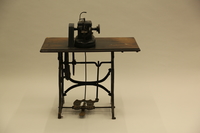
Rittershausen fur sewing machine brought with an Austrian Jewish refugee
Object
Rittershausen furrier’s sewing machine and table brought with master furrier Isidor Muschel, his wife, Ida, and their daughter, Dorit, when they left Vienna, Austria, for the United States in 1938. This durable sewing machine was designed to join several heavy animal pelts into a garment using thick, treated thread and a heavy duty, horizontal needle. On March 13, 1938, Germany annexed Austria. New legislation was created that quickly restricted Jewish life. Not long after, Isidor was publically humiliated in the street and later, he was arrested and taken to the train station where he escaped before he was deported. Ida’s mother, Rosa Rubel, helped Isidor, Ida, and their newborn daughter, Dorit, find an American to sponsor their immigration by writing to Myro Glass, a young man whom she had helped years before. He lived in Indianapolis, Indiana, and secured sponsorship for the Muschel family from the president of the Indiana Fur Company. Ida, a Romanian citizen, managed to avoid the German emigration quota for foreigners by pretending to be Dorit’s nanny. In October 1938, the family missed their scheduled train to the Netherlands, and later learned that everyone on that train had been shot by Nazis. On October 29, the Muschel family boarded the SS Pennland in Vlissingen, Netherlands. In November, they arrived in New York City, where they boarded a train to Indianapolis. Ida’s mother, Rosa, immigrated to the US, and in 1939 and 1940, Isidor helped his brothers Lazar, Edmund, Wilhelm, and Josef do the same. Isidor’s family settled in Indianapolis.
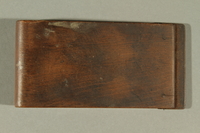
Combination fur scraper and stretching block brought with an Austrian Jewish refugee
Object
Wooden stretching block with embedded fur scraper brought with Isidor Muschel, his wife, Ida, and their daughter, Dorit, when they left Vienna, Austria, for the United States in 1938. Isidor, a master furrier, used this tool to stretch, shape, and prepare sections of animal fur for use in handcrafted garments. On March 13, 1938, Germany annexed Austria. New legislation was created that quickly restricted Jewish life. Not long after, Isidor was publically humiliated in the street and later, he was arrested and taken to the train station where he escaped before he was deported. Ida’s mother, Rosa Rubel, helped Isidor, Ida, and their newborn daughter, Dorit, find an American to sponsor their immigration by writing to Myro Glass, a young man whom she had helped years before. He lived in Indianapolis, Indiana, and secured sponsorship for the Muschel family from the president of the Indiana Fur Company. Ida, a Romanian citizen, managed to avoid the German emigration quota for foreigners by pretending to be Dorit’s nanny. In October 1938, the family missed their scheduled train to the Netherlands, and later learned that everyone on that train had been shot by Nazis. On October 29, the Muschel family boarded the SS Pennland in Vlissingen, Netherlands. In November, they arrived in New York City, where they boarded a train to Indianapolis. Ida’s mother, Rosa, immigrated to the US, and in 1939 and 1940, Isidor helped his brothers, Lazar, Edmund, Wilhelm, and Josef do the same. Isidor’s family settled in Indianapolis.
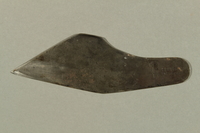
Schulder and Sons furrier’s knife brought with an Austrian Jewish refugee
Object
Angled, Schulder and Sons fur knife brought with Isidor Muschel, his wife, Ida, and their daughter, Dorit, when they left Vienna, Austria, for the United States in 1938. Isidor, a master furrier, used this tool with replaceable blade to cut sections of tough animal fur and hide for use in handcrafted garments. On March 13, 1938, Germany annexed Austria. New legislation was created that quickly restricted Jewish life. Not long after, Isidor was publically humiliated in the street and later, he was arrested and taken to the train station where he escaped before he was deported. Ida’s mother, Rosa Rubel, helped Isidor, Ida, and their newborn daughter, Dorit, find an American to sponsor their immigration by writing to Myro Glass, a young man whom she had helped years before. He lived in Indianapolis, Indiana, and secured sponsorship for the Muschel family from the president of the Indiana Fur Company. Ida, a Romanian citizen, managed to avoid the German emigration quota for foreigners by pretending to be Dorit’s nanny. In October 1938, the family missed their scheduled train to the Netherlands, and later learned that everyone on that train had been shot by Nazis. On October 29, the Muschel family boarded the SS Pennland in Vlissingen, Netherlands. In November, they arrived in New York City, where they boarded a train to Indianapolis. Ida’s mother, Rosa, immigrated to the US, and in 1939 and 1940, Isidor helped his brothers, Lazar, Edmund, Wilhelm, and Josef do the same. Isidor’s family settled in Indianapolis.
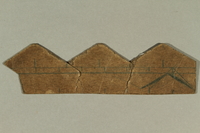
Peaked cutting template brought with an Austrian Jewish refugee
Object
Cardboard cutting template brought with Isidor Muschel, his wife, Ida, and their daughter, Dorit, when they left Vienna, Austria, for the United States in 1938. Isidor, a master furrier, used this peaked template to shape sections of animal fur for use in handcrafted garments. On March 13, 1938, Germany annexed Austria. New legislation was created that quickly restricted Jewish life. Not long after, Isidor was publically humiliated in the street and later, he was arrested and taken to the train station where he escaped before he was deported. Ida’s mother, Rosa Rubel, helped Isidor, Ida, and their newborn daughter, Dorit, find an American to sponsor their immigration by writing to Myro Glass, a young man whom she had helped years before. He lived in Indianapolis, Indiana, and secured sponsorship for the Muschel family from the president of the Indiana Fur Company. Ida, a Romanian citizen, managed to avoid the German emigration quota for foreigners by pretending to be Dorit’s nanny. In October 1938, the family missed their scheduled train to the Netherlands, and later learned that everyone on that train had been shot by Nazis. On October 29, the Muschel family boarded the SS Pennland in Vlissingen, Netherlands. In November, they arrived in New York City, where they boarded a train to Indianapolis. Ida’s mother, Rosa, immigrated to the US, and in 1939 and 1940, Isidor helped his brothers, Lazar, Edmund, Wilhelm, and Josef do the same. Isidor’s family settled in Indianapolis.
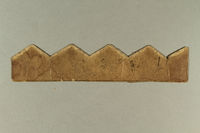
Peaked cutting template brought with an Austrian Jewish refugee
Object
Cardboard cutting template brought with Isidor Muschel, his wife, Ida, and their daughter, Dorit, when they left Vienna, Austria, for the United States in 1938. Isidor, a master furrier, used this peaked template to shape sections of animal fur for use in handcrafted garments. On March 13, 1938, Germany annexed Austria. New legislation was created that quickly restricted Jewish life. Not long after, Isidor was publically humiliated in the street and later, he was arrested and taken to the train station where he escaped before he was deported. Ida’s mother, Rosa Rubel, helped Isidor, Ida, and their newborn daughter, Dorit, find an American to sponsor their immigration by writing to Myro Glass, a young man whom she had helped years before. He lived in Indianapolis, Indiana, and secured sponsorship for the Muschel family from the president of the Indiana Fur Company. Ida, a Romanian citizen, managed to avoid the German emigration quota for foreigners by pretending to be Dorit’s nanny. In October 1938, the family missed their scheduled train to the Netherlands, and later learned that everyone on that train had been shot by Nazis. On October 29, the Muschel family boarded the SS Pennland in Vlissingen, Netherlands. In November, they arrived in New York City, where they boarded a train to Indianapolis. Ida’s mother, Rosa, immigrated to the US, and in 1939 and 1940, Isidor helped his brothers, Lazar, Edmund, Wilhelm, and Josef do the same. Isidor’s family settled in Indianapolis.
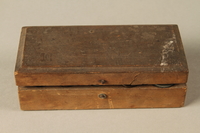
Set of scale weights brought with an Austrian Jewish refugee
Object
A set of 7 metric, silver and brass colored metal apothecary weights in a fitted wooden box brought with master furrier Isidor Muschel, his wife, Ida, and their daughter, Dorit, when they left Vienna, Austria, for the United States in 1938. The weights were used to measure small quantities of bulk goods on a balance scale. On March 13, 1938, Germany annexed Austria. New legislation was created that quickly restricted Jewish life. Not long after, Isidor was publically humiliated in the street and later, he was arrested and taken to the train station where he escaped before he was deported. Ida’s mother, Rosa Rubel, helped Isidor, Ida, and their newborn daughter, Dorit, find an American to sponsor their immigration by writing to Myro Glass, a young man whom she had helped years before. He lived in Indianapolis, Indiana, and secured sponsorship for the Muschel family from the president of the Indiana Fur Company. Ida, a Romanian citizen, managed to avoid the German emigration quota for foreigners by pretending to be Dorit’s nanny. In October 1938, the family missed their scheduled train to the Netherlands, and later learned that everyone on that train had been shot by Nazis. On October 29, the Muschel family boarded the SS Pennland in Vlissingen, Netherlands. In November, they arrived in New York City, where they boarded a train to Indianapolis. Ida’s mother, Rosa, immigrated to the US, and in 1939 and 1940, Isidor helped his brothers, Lazar, Edmund, Wilhelm, and Josef do the same. Isidor’s family settled in Indianapolis.



